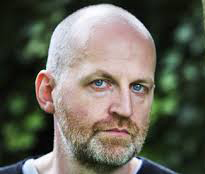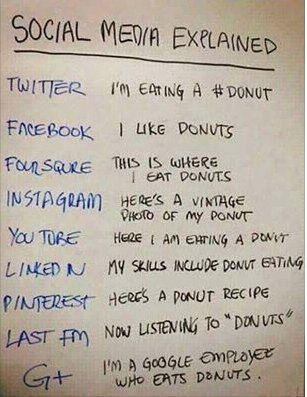The sun, happily, reached the north west on Sunday, so since then we have been able to sit beside the sparkling lake – which has now returned to its proper bounds – enjoying the peace. The snow on the mountain tops has still not disappeared, so I imagine it’s still pretty chilly up there. The only sounds are the rattling woodpeckers, the lapping of gentle waves and the honking of many geese. Sometimes the geese take off in noisy panic in the middle of the night – but we are certainly not short of sleep in this deep peace.
 The first speaker at the Theatre on the Lake on Sunday was Michael Rosen who was talking about his book ‘Alphabetical’. This was hugely enjoyable: both informative and highly amusing. The session got quite noisy as the theatre kept erupting in laughter; but in between the hilarity he presented many gems he had discovered in the course of his research. The ground covered ranged over the Phoenicians, The Grimms Brothers, Beowulf, Yiddish and the Beaker people; and such was the enjoyment all round that Michael was not able to stop, nor the audience to tire, so he ran well over time. I tried to resist buying his (rather expensive) book, but when I saw a signed copy still sitting on the book stall the next day, my resolutions melted and it is now taking up room in the van.
The first speaker at the Theatre on the Lake on Sunday was Michael Rosen who was talking about his book ‘Alphabetical’. This was hugely enjoyable: both informative and highly amusing. The session got quite noisy as the theatre kept erupting in laughter; but in between the hilarity he presented many gems he had discovered in the course of his research. The ground covered ranged over the Phoenicians, The Grimms Brothers, Beowulf, Yiddish and the Beaker people; and such was the enjoyment all round that Michael was not able to stop, nor the audience to tire, so he ran well over time. I tried to resist buying his (rather expensive) book, but when I saw a signed copy still sitting on the book stall the next day, my resolutions melted and it is now taking up room in the van.
 I had heard Charlotte Higgins lecture before, on Boudicca, so went to her session on ‘Under Another Sky: The Romans in Britain’. Quite a bit of the presentation was taken up with information about the archaeologist and scholar Robin Collingwood, who was born in Coniston, and Edward Williams Byron Nicholson, the librarian at the Bodleian Library at the beginning of the twentieth century. Charlotte also talked about, and showed slides of, the Tullie House helmet discovered in 2010, which is now in the Crosby Garrett museum. Unfortunately, because single bronze items were not covered by the Treasure Act of 1996, the helmet was privately restored before being put on the open market; and even to someone with no claims to expertise in the period, it was pretty clear that the restoration was something of a catastrophe.
I had heard Charlotte Higgins lecture before, on Boudicca, so went to her session on ‘Under Another Sky: The Romans in Britain’. Quite a bit of the presentation was taken up with information about the archaeologist and scholar Robin Collingwood, who was born in Coniston, and Edward Williams Byron Nicholson, the librarian at the Bodleian Library at the beginning of the twentieth century. Charlotte also talked about, and showed slides of, the Tullie House helmet discovered in 2010, which is now in the Crosby Garrett museum. Unfortunately, because single bronze items were not covered by the Treasure Act of 1996, the helmet was privately restored before being put on the open market; and even to someone with no claims to expertise in the period, it was pretty clear that the restoration was something of a catastrophe.
For my dose of poetry for the day I went to the reading by Don Paterson: ‘A Life in Poems’. Don  is a good poet, with a great flair for rhyme and a facility for sonnets and ballads. His strong Scottish accent allied to the soft acoustics meant some gems were missed, but it was an interesting and varied reading. I think Don probably revels in the image of a ‘grim Scot’, and there were not many giggles in the hour. His description of Dundee as so awful that in the competition for City of Culture it ‘lost to Hull’ did, however, raise a few laughs. He does not want to write in Scots as it is a dead language; and one charming piece of information I brought away with me was that there are 63 words for ‘coughing’ in Scots.
is a good poet, with a great flair for rhyme and a facility for sonnets and ballads. His strong Scottish accent allied to the soft acoustics meant some gems were missed, but it was an interesting and varied reading. I think Don probably revels in the image of a ‘grim Scot’, and there were not many giggles in the hour. His description of Dundee as so awful that in the competition for City of Culture it ‘lost to Hull’ did, however, raise a few laughs. He does not want to write in Scots as it is a dead language; and one charming piece of information I brought away with me was that there are 63 words for ‘coughing’ in Scots.
This year is the 100th anniversary of the birth of the Lakeland poet Norman Nicholson, who was born in Millom and lived in the house in which he was born for his whole life; so Sunday evening was taken up with a celebration of his life and work. Kathleen Jones has written a biography of Nicholson, ‘The Whispering Poet: A Tribute’, to coincide with this anniversary, and the talk with which she introduced the event was fascinating and charming enough to persuade anyone to buy her book.
 Kathleen showed the influence of Methodism on the poet’s development, the part played by various friends and relations, the effect of the two years Nicholson spent in a sanatorium when he contracted TB in his teens, and his passion for the environment and what would now be called ‘green issues’. After a short interval, Neil Curry, a local poet and friend of Nicholson, gave a reading and a talk for a further hour, with more information about Nicholson. Given that we’d already had nearly an hour on the poet, this second talk could, perhaps, have benefitted from being a little shorter – though Currie offered us plenty of interesting material and it was good to hear some of the poems.
Kathleen showed the influence of Methodism on the poet’s development, the part played by various friends and relations, the effect of the two years Nicholson spent in a sanatorium when he contracted TB in his teens, and his passion for the environment and what would now be called ‘green issues’. After a short interval, Neil Curry, a local poet and friend of Nicholson, gave a reading and a talk for a further hour, with more information about Nicholson. Given that we’d already had nearly an hour on the poet, this second talk could, perhaps, have benefitted from being a little shorter – though Currie offered us plenty of interesting material and it was good to hear some of the poems.
The evening finished with a video extract from a 30-year-old South Bank Show on Nicholson which showed Nicholson reciting some of his poems — not to mention an extremely young-looking Melvyn Bragg introducing the programme.
 I attended only one event on Monday: Ewan Clayton, the calligrapher, talking about his book ‘The Golden Thread: The Story of Writing’. An enthusiastic speaker with a wide range of experience and expertise made for a fascinating lecture which covered handwriting, Xerox, typewriters and fountain pens. Among the nuggets I brought away with me were the following: in 2012, there were 6.1 billion mobile ‘phone subscribers; 14 million bic pens are sold daily; fountain pen sales increased by 50% last year; in the light of recent security breaches, typewriters, instead of computers, are increasingly being used for top secret intelligence; and it’s predicted that in 2017 50% of all computers will be tablets. Ewan was optimistic about the future of handwriting, and suggested that we should be using all the tools at our disposal, rather than favouring one or other.
I attended only one event on Monday: Ewan Clayton, the calligrapher, talking about his book ‘The Golden Thread: The Story of Writing’. An enthusiastic speaker with a wide range of experience and expertise made for a fascinating lecture which covered handwriting, Xerox, typewriters and fountain pens. Among the nuggets I brought away with me were the following: in 2012, there were 6.1 billion mobile ‘phone subscribers; 14 million bic pens are sold daily; fountain pen sales increased by 50% last year; in the light of recent security breaches, typewriters, instead of computers, are increasingly being used for top secret intelligence; and it’s predicted that in 2017 50% of all computers will be tablets. Ewan was optimistic about the future of handwriting, and suggested that we should be using all the tools at our disposal, rather than favouring one or other.

Then it was off to enjoy the more active delights of a Lake District bathed in warm sunshine. We walked up to the Castlerigg Stone Circle, which is reputed to be the oldest stone circle in Europe, dating from over 3000 BC. It is certainly beautiful and has a wonderful atmosphere, set on a round flat plateau and encircled by mountains.
If you look carefully, you’ll see the snowy peak of Helvellyn peeping through from behind the other hills.
2 Comments


